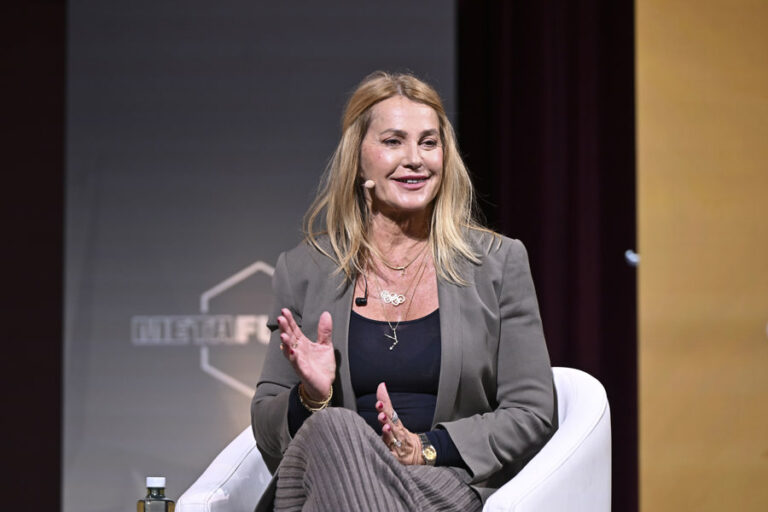
Comaneci, regarding the gender test: “I understand inclusion, but women’s sport is for women.”
Madrid, Nov 17 (EFE)
Former gymnast Nadia Comaneci, who won five Olympic gold medals and achieved the first perfect score of 10 at the Games, has expressed her support for gender testing in some sports, such as athletics and boxing, to check testosterone levels. In her opinion, while inclusion must be respected, “women’s sport belongs to women.”

Comaneci, who is visiting Madrid to participate in a forum organized by Atresmedia, praised American gymnast Simone Biles in an interview with EFE, asserting that there will be no one like her “for at least the next 50 years.”
Regarding Russian athletes competing under a neutral flag while the conflict with Ukraine persists, the 64-year-old Romanian-born, naturalized American gymnast defends this approach, believing it “is a way to properly include people.”

Question (Q). Next year will mark 50 years since her great feat in Montreal in 1976, where she achieved the first perfect 10 in Olympic history. What remains of that little girl?
Answer (A): That little girl is still that same little girl, and she’s still here; she’s the same person. That girl who started gymnastics at six years old had no idea she’d ever go to the Olympics. I had so much energy that my mother had to sign me up for something, and it was very difficult to find places for girls to practice sports back then. I loved competing and challenging myself. I didn’t get great results, but I learned to get back up every time I fell. I’m very proud of that little girl.

Q: Romania has declared 2026 the Year of Nadia Comaneci. Is that something that pleases you, considering the country’s political evolution?
A: Yes, of course. My husband said, ‘Some people are lucky enough to get a day, and you’ve gotten a whole year.’ It’s an honor. It’s an honor that what happened in 1976 will go down in the history of gymnastics and Romania.
Q: You only participated in two Olympic Games, Montreal and Moscow 1980. Is there anything you felt you had left undone?
A: Well, as far as the sport is concerned, I don’t have the opportunity to do anything else. I think the two Olympic Games were different. In one, I was the youngest; nobody knew me. In the second, I had to defend my title. But I think that being able to win three European championships in a row and being the best for six years is also something. I didn’t start gymnastics to make history or to be the best. People usually say that records are made to be broken. I have two that can never be broken: the first was for being the best, and the second for being the youngest.

Q: Simone Biles withdrew from Tokyo 2020 due to her mental health. Do you think psychological pressure is now the biggest threat to sport?
R. I don’t think that’s a problem, given that it’s something we’re all going to have to learn to manage, and I don’t think it’s anything new because it’s not like it just appeared now. What happened with Simone is that she was exposed to this kind of thing, something that’s been happening a lot in the world of sports. Years ago, nobody talked about it; there wasn’t even a name for it. There were days when you didn’t feel well, but we had to find a way to get through it.
In those circumstances, it was taboo. It wasn’t talked about because it was considered a weakness, and now I think it’s good that everyone understands that even if you don’t play sports, it’s part of life, and it will happen to you at some point.
Q. Currently, who do you think is the gymnast who can take over from Simone Biles?
R. I don’t think anyone can reach her level, at least not for the next 50 years. Or if it happens at some point, it’s too soon to say who will be her successor. Perhaps next year, when I see the new gymnasts, I’ll be able to say who the next one might be.

Q. The big winner at the last World Gymnastics Championships in Jakarta was the Russian Angelina Melnikova, who competes under a neutral flag. Should the ban on the Russian flag continue at next year’s Winter Games in Italy?
A. The federations were the ones who allowed the athletes to compete under the white flag. It was the first time this had happened in gymnastics. The athletes are the ones who suffer because of these situations, and I hope peace will come soon so that all athletes have the opportunity to compete, as it’s a way to properly include everyone.
Q. At Paris 2024, there was controversy about the gender of the Algerian boxer Imane Khelif. Do you agree with gender testing?
A. Of course, we have to safeguard women’s sports and use the rules so that everyone competes fairly. It was a great decision by the new president of the International Olympic Committee. I understand the importance of inclusion, but women’s sports are for women.




